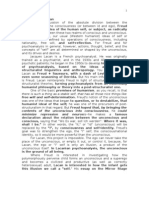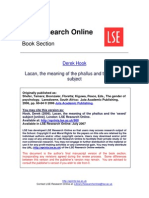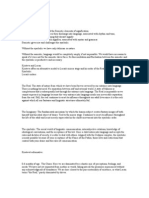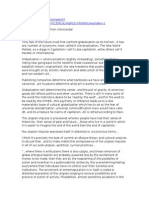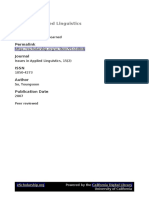JACQUES LACAN has proven to be an important influence on contemporary critical theory, influencing such disparate approaches as feminism (through,
for example, Judith Butler and Shoshana Felman), film theory (Laura Mulvey, Kaja Silverman, and the various film scholars associated with "screen theory"), poststructuralism (Cynthia Chase, Juliet Flower MacCannell, etc.), and Marxism (Louis Althusser, Ernesto Laclau, Chantal Mouffe, Fredric Jameson, Slavoj Zizek, etc.). Lacan is also exemplary of what we can understand as the postmodern break with Sigmund Freud. Whereas Freud could still be said to work within an empirical, humanist tradition that still believes in a stable self's ability to access the "truth," Lacan is properly post-structuralist, which is to say that Lacan questions any simple notion of either "self" or "truth," exploring instead how knowledge is constructed by way of linguistic and ideological structures that organize not only our conscious but also our unconscious lives.
Whereas Freud continued to be tempted by organic models and with a desire to find the neurological and, thus, "natural" causes for sexual development, Lacan offered a more properly linguistic model for understanding the human subject's entrance into the social order. The emphasis was thus
less on the bodily causes of behavior (cathexis, libido, instinct, etc.) than it was on the ideological structures that, especially through language, make the human subject come to understand his or her relationship to himself and to
Indeed, according to Lacan, the entrance into language necessarily entails a radical break from any sense of materiality in and of itself. According to Lacan, one must always distinguish between reality
others. (the fantasy world we convince ourselves is the world around us) and the real (a materiality of existence beyond language and thus beyond expressibility). The development of the subject, in other words, is made possible by an endless misrecognition of the real because of our need to construct our sense of "reality" in and through language. So much are we reliant on our linguistic and social version of "reality" that the eruption of pure materiality (of the real) into our lives is radically disruptive. And yet, the real is the rock against which all of our artificial linguistic and social structures necessarily fail. It is this tension between the real and our social laws, meanings, conventions, desires, etc. that determines our psychosexual lives. Not even our unconscious escapes the effects of language, which is why Lacan argues that "the unconscious is structured like a language" (Four
�Fundamental 203).
Lacan's version of psychosexual development is, therefore, organized around the subject's ability to recognize, first, iconic signs and, then, eventually, language. This entrance into language follows a particular developmental model, according to Lacan, one that is quite distinct from Freud's version of the same (even though Lacan continued to arguesome would say "perversely"that he was, in fact, a strict Freudian). Here, then, is your story, as told by Lacan, with the ages provided as very rough approximations since Lacan, like Freud, acknowledged that development varied between individuals and that stages could even exist simultaneously within a given individual:
0-6 months of age. In the earliest stage of development, you were dominated by a chaotic mix of perceptions, feelings, and needs. You did not distinguish your own self from that of your parents or even the world around
you spent your time taking into yourself everything that you experienced as pleasurable without any acknowledgment of boundaries. This is the
you. Rather, stage, then, when you were closest to the pure materiality of existence, or what Lacan terms "the Real." Still, even at this early stage, your body began to be fragmented into specific erogenous zones (mouth, anus, penis, vagina), aided by the fact that your mother tended to pay special attention to these body parts. This "territorialization" of the body could already be seen as a falling off, an imposition of boundaries and, thus, the neo-natal beginning of socialization (a first step away from the Real). Indeed, this fragmentation was accompanied by an identification with those things perceived as fulfilling your lack at this early stage: the mother's breast, her voice, her gaze. Since these privileged external objects could not be perfectly assimilated and could not, therefore, ultimately fulfill your lack, you already began to establish the psychic dynamic (fantasy vs. lack) that would control the rest of your life.
6-18 months of age. This stage, which Lacan terms the "mirror stage," was a central moment in your development. The "mirror stage" entails a "libidinal dynamism" (crits 2) caused by the young child's identification with his own image (what Lacan terms the "Ideal-I" or "ideal ego"). For Lacan, this act marks the primordial recognition of one's self as "I," although at a point "before it is objectified in the dialectic of identification with the other, and
�before language restores to it, in the universal, its function as subject" (crits 2). In other words, this recognition of the self's image precedes the entrance into language, after which the subject can understand the place of that image of the self within a larger social order, in which the subject must negotiate his or her relationship with others. Still, the mirror stage is necessary for the next stage, since to recognize yourself as "I" is like recognizing yourself as other ("yes, that person over there is me"); this act is thus fundamentally self-
your feelings towards the image were mixed, caught between hatred ("I hate that version of myself because it is so much better than me") and love ("I want to be like that image").Note This "Ideal-I" is important precisely because
alienating. Indeed, for this reason it represents to the subject a simplified, bounded form of the self, as opposed to the turbulent chaotic perceptions, feelings, and needs felt by the infant. This "primordial Discord" (crits 4) is particularly formative for the subject, that is, the discord between, on the one hand, the idealizing image in the mirror and, on the other hand, the reality of one's body between 6-18 months ("the signs of uneasiness and motor unco-ordination of the neo-natal months" [crits 4]): "The mirror stage is a drama whose internal thrust is precipitated from insufficiency to anticipationand which manufactures for the subject, caught up in the lure of spatial identification, the succession of phantasies that extends from a fragmented body-image to a form of its totality that I shall call orthopaedicand, lastly, to the assumption of the armour of an alienating identity, which will mark with its rigid structure the subject's entire mental development" (crits 4). This misrecognition or mconnaissance (seeing an ideal-I where there is a fragmented, chaotic body) subsequently
In particular, this creation of an ideal version of the self gives preverbal impetus to the creation of narcissistic phantasies in the fully developed subject. It establishes
"characterizes the ego in all its structures" (crits 6). what Lacan terms the "imaginary order" and, through the imaginary, continues to assert its influence on the subject even after the subject enters the next stage of development. 18 months to 4 years of age. The acquisition of language during this next stage of development further separated you from a connection to the Real
Lacan builds on such semiotic critics as Ferdinand de Saussure to show
(from the actual materiality of things).
�how language is a system that makes sense only within its own internal logic of differences: the word, "father," only makes sense in terms of those other terms it is defined with or against (mother, "me," law, the social, etc.). As Kaja Silverman puts it, "the signifier 'father'
has no relation whatever to the physical fact of any individual father. Instead, that signifier finds its support in a network of other signifiers, including 'phallus,' 'law,' 'adequacy,' and 'mother,' all of which are equally indifferent to the category of the real" (164). Once you entered into the differential system of language, it forever afterwards determined your perception of the world around you, so that the intrusion of the Real's materiality becomes a traumatic event, albeit one that is quite common since our version of "reality" is built over the chaos of the Real (both the materiality outside you and the
By acquiring language, you entered into what Lacan terms the "symbolic order"; you were reduced into an empty signifier ("I") within the field of the Other, which is to say, within a field of language and culture (which is always determined by those others that came before you). That linguistic position,
chaotic impulses inside you). according to Lacan, is particularly marked by gender differences, so that all your actions were subsequently determined by your sexual position (which, for Lacan, does not have much to do with your "real" sexual urges or even your sexual markers but by a linguistic system in which "male" and "female" can only be understood in relation to each other in a system of language).
The Oedipus complex is just as important for Lacan as it is for Freud, if not more so. The difference is that Lacan maps that complex onto the acquisition
. The process of moving through the Oedipus complex (of being made to recognize that we cannot sleep with or even fully "have" our mother) is our way of
of language, which he sees as analogous
�recognizing the need to obey social strictures and to follow a closed differential system of language in which we understand "self" in relation to "others." In this linguistic rather than biological
system, the "phallus" (which must always be understood not to mean "penis") comes to stand in the place of everything the subject loses through his entrance into language (a sense of perfect and ultimate meaning or plenitude, which is, of course, impossible) and all the power associated with what Lacan terms the "symbolic father" and the "Name-of-the-Father" (laws, control, knowledge). Like the phallus' relation to the penis, the "Nameof-the-Father" is much more than any actual father; in fact, it is ultimately more analogous to those social structures that control our lives and that interdict many of our actions (law, religion, medicine, education).Note
After
one passes through the Oedipus complex, the position of the phallus (a position within that differential system) can be assumed by most anyone (teachers, leaders, even the mother) and, so, to repeat, is not synonymous with either the biological father or the biological penis.
Nonetheless, the anatomical differences between boys and girls do lead to a different trajectory for men and women in Lacan's system. Men achieve access to the privileges of the phallus, according to Lacan, by denying their last link to the Real of their own sexuality (their actual penis); for this reason, the castration complex continues to function as a central aspect of the boy's psychosexual development for Lacan. In accepting the dictates of the Name-of-the-Father, who is associated with the symbolic phallus, the male subject denies his sexual needs and, forever after, understands his relation to others in terms of his position within a larger system of rules, gender differences, and desire. (On Lacan's understanding of desire, see the third module.) Since women do not experience the castration complex in the same way (they do not have an actual penis that must be denied in their access to the symbolic order), Lacan argues that women are not socialized in the same way, that they remain more closely tied to what Lacan terms "jouissance," the lost plenitude of one's material bodily drives given up by the male subject in order to access the
�symbolic power of the phallus. Women are thus at once more lacking (never accessing the phallus as fully) and more full (having not experienced the loss of the penis as fully).Note
Regardless, what defines the position of both the man and the women in this schema is above all lack, even if that lack is articulated differently for men and women.
EGO-IDEAL AND IDEAL-EGO (Lacan) : Lacan makes a distinction between the "ideal ego"(imaginary order) and the "ego ideal,"(symbolic order) the former of which he associates with the imaginary order, the latter of which he associates with the symbolic order. Lacan's "ideal ego" is the ideal of perfection that the ego strives to emulate; it first affected the subject when he saw himself in a mirror during the mirror stage, which occurs around 6-18 months of age (see the Lacan module on psychosexual development). Seeing that image of oneself established a discord between the idealizing image in the mirror (bounded, whole, complete) and the chaotic reality of the one's body between 6-18 months, thus setting up the logic of the imaginary's fantasy construction that would dominate the subject's psychic life ever after. For Lacan, the "ego-ideal," by contrast, is when the subject looks at himself as if from that ideal point; to look at oneself from that point of perfection is to see one's life as vain and useless. The effect, then, is to invert one's "normal" life, to see it as suddenly repulsive. NAME-OF-THE-FATHER (Lacan): The laws and restrictions that control both your desire and the rules of communication, according to Lacan. The Nameof-the-Father is closely bound up with the superego, the Phallus, the symbolic order, and the Oedipus complex. Note that, according to Lacan, the Name-ofthe-Father has a shadow double in the Father-of-Enjoyment. See the Lacan module on the structure of the psyche. CASTRATION COMPLEX: The early childhood fear of castration that Freud and Lacan both saw as an integral part of our psychosexual development. The castration complex is closely associated with the Oedipus complex, according to Freud: "the reaction to the threats against the child aimed at putting a stop to his early sexual activities and attributed to his father" (Introductory Lectures 15.208) . The young child with primitive desires, in coming face to face with the laws and conventions of society (including the prohibitions against incest and murder), will tend to align prohibition with castration (something that is sometimes reinforced by parents if they warn against, for example, masturbation by saying that the child will in some way be punished bodily, eg. by going blind). Lacan builds on this Freudian concept in defining the Law of the Father.
�****************************************************************************** ****************************************************************************** ********Lacan Module pt 2: The Structure of the Psyche THE PSYCHE CAN BE DIVIDED into three major structures that control our lives and our desires. Most of Lacan's many terms for the full complexity of the psyche's workings can be related to these three major concepts, which correlate roughly to the three main moments in the individual's development, as outlined in the Lacan module on psychosexual development:
1) The Real. This concept marks the state of nature from which we have been forever severed by our entrance into language. Only as neo-natal children were we close to this state of nature, a state in which there is nothing but need. A baby needs and seeks to satisfy those needs with no sense for any separation between itself and the external world or the world of others. For this reason, Lacan sometimes represents this state of nature as a time of fullness or completeness that is subsequently lost through the entrance into language. The primordial animal need for copulation (for example, when animals are in heat) similarly corresponds to this state of nature. There is a need followed by a search for satisfaction. As far as humans are concerned, however, "the real is impossible," as Lacan was fond of saying. It is impossible in so far as we cannot express it in language because the very entrance into language marks our irrevocable separation from the real. Still, the real continues to exert its influence throughout our adult lives since it is the rock against which all our fantasies and linguistic structures ultimately fail. The real for example continues to erupt whenever we are made to acknowledge the materiality of our existence, an acknowledgement that is usually perceived as traumatic (since it threatens our very "reality"), although it also drives Lacan's sense of jouissance.
1) The Real. This concept marks the state of nature from which we have been forever severed by our entrance into language. Only as neo-natal children were we close to this state of nature, a state in which there is nothing but need. A baby needs and seeks to satisfy those needs with no sense for any separation between itself and the external world or the world of others. For this reason, Lacan sometimes represents this state of nature as a time of fullness or completeness that is subsequently lost through the entrance into language. The primordial animal need for copulation (for example, when animals are in heat) similarly corresponds to this state of nature. There is a need followed by a search for satisfaction. As far as humans are concerned, however,
"the real is impossible,"
as Lacan was fond of saying. It
�is impossible in so far as we cannot express it in language because the very entrance into language marks our irrevocable separation from the real. Still, the real continues to exert its influence throughout our adult lives since it is the rock against which all our fantasies and linguistic structures ultimately fail. The real for example continues to erupt whenever we are made to acknowledge the materiality of our existence, an acknowledgement that is usually perceived as traumatic (since it threatens our very "reality"), although it also drives Lacan's sense of jouissance.
2) The Imaginary Order. This concept corresponds to the mirror stage (see the Lacan module on psychosexual development) and marks the movement of the subject from primal need to what Lacan terms "demand." As the connection to the mirror stage suggests, the "imaginary" is primarily narcissistic even though it sets the stage for the fantasies of desire. (For Lacan's understanding of desire, see the next module.)
Whereas needs can be fulfilled, demands are, by definition, unsatisfiable; in other words, we are already making the movement into the sort of lack that, for Lacan, defines the human subject. Once a child begins to recognize that
its body is separate from the world and its mother, it begins to feel anxiety,
The demand of the child, then, is to make the other a part of itself, as it seemed to be in the child's now lost state of nature (the
which is caused by a sense of something lost. neo-natal months). The child's demand is, therefore, impossible to realize and functions, ultimately, as a reminder of loss and lack. (The difference between "demand" and "desire," which is the function of the symbolic order, is simply the acknowledgement of language, law, and community in the latter; the demand of the imaginary does not proceed beyond a dyadic relation between the self and the object one wants to make a part of oneself.) The mirror stage corresponds to this demand in so far as the child misrecognizes in its mirror image a stable, coherent, whole self, which, however, does not correspond to the real child (and is, therefore, impossible to realize). The image is a fantasy, one that the child sets up in order to compensate for its sense of lack or loss, what Lacan terms an "Ideal-
That fantasy image of oneself can be filled in by others who we may want to emulate in our adult lives
I" or "ideal ego."
�(role models, et cetera), anyone that we set up as a mirror for ourselves in what is, ultimately, a narcissistic relationship. What must be remembered is that for Lacan this imaginary
realm continues to exert its influence throughout the life of the adult and is not merely superceded in the child's movement into the symbolic (despite my suggestion of a straightforward chronology in the last module). Indeed, the imaginary and the symbolic are, according to Lacan, inextricably intertwined and work in tension with the Real.
Whereas the imaginary is all about equations and identifications, the symbolic is about language and narrative. Once a
3) The Symbolic Order (or the "big Other"). child enters into language and accepts the rules and dictates of society, it is
The acceptance of language's rules is aligned with the Oedipus complex, according to Lacan. The
able to deal with others. symbolic is made possible because of your acceptance of the Name-of-theFather, those laws and restrictions that control both your desire and the rules
"It is in the name of the father that we must recognize the support of the symbolic function which, from the dawn of history, has identified his person with the figure of the law"
of communication: (crits 67). Through recognition of the Name-of-the-Father, you are able to enter into a community of others. The symbolic, through language, is "the pact which links... subjects together in one action. The human action par excellence is originally founded on the existence of the world of the symbol, namely on laws and contracts" (Freud's Papers 230). NARCISSISM: Self-love. Ideally, the libido directs its energies to objects ("object-libido"), including eventually one's love-object. However, the libido can also attach itself to the ego ("ego-libido") to the exclusion of external object-cathexes. This situation leads, according to Freud, to narcissistic behavior and to narcissistic neuroses such as megalomania. Lacan makes narcissism an even more central aspect of the human psyche, aligning it with what he terms the "imaginary order," one of the three major structures of the psyche (along with the Real and the symbolic order). Lacan suggests that, whereas the zero form of sexuality for animals is copulation, the zero form of sexuality for humans is masturbation. The act of sex for humans is so much
�caught up in our fantasies (our idealized images of both ourselves and our sexual partners) that it is ultimately narcissistic. As Lacan puts it, "That's what love is. It's one's own ego that one loves in love, one's own ego made real on the imaginary level" (Freud's Papers 142) ****************************************************************************** ****************************************************************************** ** Lacan module pt 3: DESIRE G IVEN MAN'S RELIANCE ON LANGUAGE for entrance into the symbolic order (see the Lacan module on psychosexual development), it is not surprising
according to Lacan, we are not even in control of our own desires since those desires are themselves as separated from our actual bodily needs as the phallus is separated from any biological penis. For this
that, reason, Lacan suggests that, whereas the zero form of sexuality for animals is copulation, the zero form of sexuality for humans is masturbation. The act of sex for humans is so much caught up in our fantasies (our idealized images of both ourselves and our sexual partners) that it is ultimately narcissistic. As Lacan puts it, "That's what love is. It's one's own ego that one loves in love, one's own ego made real on the imaginary level" (Freud's Papers 142).
Because we are working on the level of fantasy construction, it is quite easy for love to turn into disgust, for example when a lover is confronted with his love-object's body in all its materiality (moles, pimples, excretions, etc.), the sorts of things that would have no effect on animal copulation. By
entering into the symbolic order (with its laws, conventions, and images for perfection), the human subject effectively divorces him/herself from the materiality of his/her bodily drives, which Lacan tends to distinguish with the term "jouissance."Note Through the Law (which we come to acknowledge by way of the Oedipus complex), the human subject effectively chooses culture over nature: "The primordial Law is therefore that which in regulating marriage ties superimposes the kingdom of culture on that of nature abandoned to the law of copulation" (40). That Law, for Lacan, is "identical to an order of Language" (40), specifically what he terms the symbolic order and it is supported by the symbolic fiction of the "Name-of-the-Father."
Desire, in other words, has little to do with material sexuality for Lacan; it is
�caught up, rather, in social structures and strictures, in the fantasy version of reality that forever dominated our lives after our entrance into language. For this reason, Lacan writes that "the unconscious is the discourse of the Other."
Even our unconscious desires are, in other words, organized by the linguistic system that Lacan terms the symbolic order or "the big Other." In a sense, then, our desire is never properly our own,
but is created through fantasies that are caught up in cultural ideologies rather than material sexuality. For this reason, according to Lacan, the command that the superego directs to the subject is, of all things, "Enjoy!" That which we may believe to be most private and rebellious (our desire) is, in fact, regulated, even commanded, by the superego.
In constructing our fantasy-version of reality, we establish coordinates for our desire; we situate both ourselves and our object of desire, as well as the relation between. As Slavoj Zizek puts it, "through fantasy, we learn how to desire" (Looking Awry 6). Our desires therefore necessarily rely on lack, since fantasy, by definition, does not correspond to anything in the real. Our object of
desire (what Lacan terms the "objet petit a") is a way for us to establish coordinates for our own desire. At the heart of desire is a misregognition of fullness where there is really nothing but a screen for our own narcissistic projections. It is that lack at the heart of desire that ensures we continue to desire. To come too close to our object of desire threatens to uncover the lack that is, in fact, necessary for our desire to persist, so that, ultimately, desire is most interested not in fully attaining the object of desire but in keeping our distance, thus allowing desire to persist. Because desire is articulated through fantasy, it is driven to some extent by its own impossibility. ****************************************************************************** ****************************************************************************** ** Lacan Module pt. 4: The Gaze JACQUES LACAN complicated his position on the Gaze as he developed his theories. At first, gazing was important in his theories in relation to the mirror stage, where the subject appears to achieve a sense of mastery by seeing
�himself as ideal ego. By viewing himself in the mirror, the subject at the mirror stage begins his entrance into culture and language by establishing his own subjectivity through the fantasy image inside the mirror, an image that the subject can aspire towards throughout his life (a stable coherent version of the self that does not correspond to the chaotic drives of our actual material bodies). Once the subject enters the symbolic order, that narcissistic ideal image is maintained in the imaginary order. As explained in the Lacan module on the structure of the psyche, that fantasy image of oneself can
be filled in by others who we may want to emulate in our adult lives (role models, love objects, et cetera), anyone that we set up as a mirror for ourselves in what is, ultimately, a narcissistic relationship.
In his later essays, Lacan complicates this understanding of the narcissistic view in the mirror by distinguishing between the eye's look and the Gaze.
Gaze in Lacan's later work refers to the uncanny sense that the object of our eye's look or glance is somehow looking back at us of its own will. This uncanny
feeling of being gazed at by the object of our look affects us in the same way as castration anxiety (reminding us of the lack at the heart of the symbolic order). We may believe that we are in control of our eye's look; however, any feeling of scopophilic power is always undone by the fact that the the materiality of existence (the Real) always exceeds and undercuts the meaning structures of the symbolic order. Lacan's favorite example for the Gaze is Hans Holbein's The Ambassadors (pictured here). When you look at the painting, it at first gives you a sense that you are in control of your look; however, you then notice a blot at the bottom of the canvas, which you can only make out if you look at the painting from the side at an angle, from which point you begin to see that the blot is, in fact, a skull staring back at
By having the object of our eye's look look back at us, we are reminded of our own lack, of the fact that the symbolic order is separated only by a fragile border from the materiality of the Real. The symbols of
you. power and desire in Holbein's painting (wealth, art, science, ambition) are thus completely undercut. As Lacan puts it, the magical floating object "reflects our own nothingness, in the figure of the death's head" (Lacan, Four Fundamental 92). Lacan then argues in "Of the Gaze as Objet Petit a" that there is an intimate relationship between the objet petit a (which coordinates our desire) and the Gaze (which threatens to undo all desire through the eruption of the Real). As I stated in the previous module, "at the heart of desire is a misregognition of
�fullness where there is really nothing but a screen for our own narcissistic projections. It is that lack at the heart of desire that ensures we continue to desire." However, because the objet petit a (the object of our desire) is ultimately nothing but a screen for our own narcissistic projections, to come too close to it threatens to give us the experience precisely of the Lacanian Gaze, the realization that behind our desire is nothing but our lack: the materiality of the Real staring back at us. That lack at the heart of desire at once allows desire to persist and threatens continually to run us aground upon the underlying rock of the Real. This concept has been particularly influential on a group of feminist film theorists who explore, on the one hand, how female objects of desire in traditional Hollywood film are reduced to passive screens for the projection of male fantasies, and, on the other hand, how the male desire for the mastery of the look is, in fact, continually undercut by a certain castration at the heart of cinema: the blank space between the frames that, only in its elision, can create the illusion of cinematic "reality." That blank space between the frames is analogous to the ever-threatening Real over which we project our narcissistic fantasy of "reality."





















